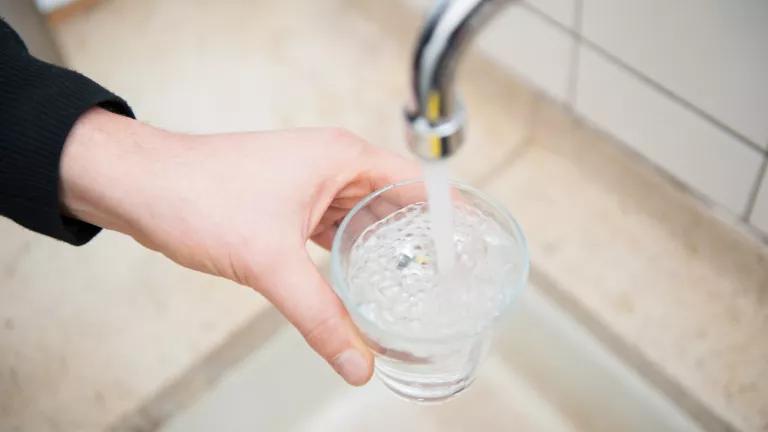The Chemical Industry and its new best friend, Tea Party Governor Paul LePage, made a recent tactical retreat, when the Governor and the industry abandoned their efforts to defeat legislation that would finalize state-adopted restrictions on the use of the endocrine-disrupting chemical bisphenol A (BPA) in baby bottles, sippy cups and other reusable food and beverage containers. The industry campaign was severely undermined by Governor LePage’s remark – a heady blend of callous and foolish -- that the worst result from exposure to BPA would be women “might grow little beards.” The comment earned LePage instant internet immortality and undercut whatever support the Governor may have had in the state legislature for his first attempt to roll back state-level protections from exposure to unsafe chemicals. Those state-level protections are extremely important, because there are no national protections.
The showdown over the legislation was scheduled to take place at a hearing before the Environment and Natural Resources Committee. Supporters of protecting children from exposure to BPA – which has been linked in hundreds of scientific studies to a range of adverse health effects including breast and prostate cancer – turned out to make their case, including my NRDC colleague Jennifer Sass. But, when the time came, the Governor’s staff opted to take “no position” on the legislation, as did all the chemical industry representatives from trade associations (who do the dirty work so actual companies won’t have to constantly be in the public eye opposing protections for children from toxic chemicals they make or use in their products). With the opposition melting away, the Committee unanimously supported ratifying the restrictions on BPA.
The Governor’s cave-in is a tribute to the strong organizing and advocacy of health groups and concerned citizens in Maine, who, rather than being intimidated or paralyzed by the chemical industry’s attacks, led by Governor LePage, fought back hard, mobilized the broad support that still exists in the state for protecting the population from toxic chemicals, and defeated the industry’s first attempt to contravene the will of the people.
This defeat of the chemical industry in Maine is one to be celebrated, and savored. While the chemical industry was successful in killing an amendment to the food safety bill in the U.S. Congress to establish a nationwide ban on the use of BPA in baby bottles and sippy cups – as opposed to the “patchwork” of laws being adopted in states across the country that the industry continually whines about – the second part of their strategy, weaken the state-led reform efforts, went down in flames. For historians, this all came about on Friday, March 25th.
Yet, the time for celebration was short. The industry and the governor took the weekend to regroup, and the following Tuesday returned to the state House promoting legislation that would gut the state’s Kid Safe Products law and, in the process, allow easy repeal by the Governor of the BPA rule and effectively prevent any other chemical from being regulated. The Kid Safe Products Act was enacted in Maine in 2008, passed unanimously by the Senate, and 129-9 by the House. Now, one of the nine House members who opposed the original law nearly 3 years ago has introduced legislation to gut the law. And (spoiler alert!) Governor LePage is all for it.
The legislation is a laundry list of every chemical industry idea for preventing Maine’s already adopted safeguards from having any effect. For example the bill would:
Spare the Illness, Spoil the Child: Narrow the category of kids to exclude protection for those not yet born (if you don’t need to protect the fetus, there is no reason to protect pregnant mothers, so much more exposure to toxic chemicals is acceptable) as well as those older than 12 (apparently under the logic that being exposed to toxic chemicals that can cause cancer -- or harm our reproductive system during the years of puberty and adolescence -- is unlikely to cause any problems later in life);
Kill the Scientist/Messenger: Disfavor science not funded by the chemical industry, such as the peer-reviewed research by independent scientists and academics that has raised the alarm about chemicals that interfere with our hormonal systems – endocrine-disrupting chemicals, the harms that may be caused by low doses (meaning real-life levels) of exposure, and the potential health impacts of cumulative exposure to multiple chemicals;
Ignore-ance is Bliss. Ignore the science that shows that children are exposed to toxic chemicals that are released into the home from many consumer products – such as couches, carpets, plastic products of all kinds, etc – by narrowing the scope of products that could be regulated to only those intentionally marketed to younger children. Exposure science shows that ingestion of household dust and breathing indoor air are major routes of toxic chemical exposure from common household products and furnishings, not just toys and baby products.
That Government is Best Which Listens to Its People the Least: Prevent Maine’s citizens from petitioning the government to take steps to restrict use of a dangerous chemical;
Protect Chemicals from Children: Restricting the government’s ability to take action, by raising the burden of proof necessary to prove that a chemical is unsafe (the whole point of the law was to place the burden where it belongs – on the chemical industry, to show that its products are safe for children to be exposed to);
Show Me the Cancer: Disregard evidence of harm from a chemical based upon animal studies. For the chemical industry, just like the tobacco industry, there is no reason to regulate a chemical until it can be conclusively proven to kill people. And, even when you can show that a chemical causes cancer, and has killed thousands of people, and will kill thousands more – as is the case with asbestos for example – well, the industry has dozens of other good reasons why it shouldn’t be regulated anyway. And, no matter what, animal studies aren’t enough, you really need proof of human illness (unless of course animal studies suggest a chemical is not harmful, those you can take to the bank). In other words: tumors in a guinea pig aren’t enough of a basis for preventing exposure to children, you would really need to wait until the tumors turned up in actual children, and then we can talk (but probably only talk).
Throw the Animals off the Ark: Drop consideration of a chemical’s impact on wildlife or the environment as factors to consider when prioritizing chemicals for regulation.
Since the chemical industry, Governor LePage, and his chemical industry lobbyist staff (one body, three heads), were blocked from killing the BPA rule, they have decided to go all-in on flat out eviscerating one of the most important chemical safety laws adopted anywhere in the U.S. Success for the industry would serve 3 purposes:
1) halt to any further actions of significance in Maine;
2) set a precedent for blocking similar efforts in dozens of other states across the country;
3) influence the politics at the national level, where the industry claims to support reform of the Toxic Substances Control Act (TSCA), but in reality has taken no meaningful affirmative steps to advance reform, and is, by and large, spending most of its time and resources to block such reform. The bill being pushed in Maine is a template for what industry’s vision of “reform” of TSCA will look like, if they ever get around to putting something on the table to discuss.
The fight now underway in Maine is everybody’s fight. It is the fight over whether our state and federal governments, and citizens of the United States, are going to be able to take meaningful steps to protect ourselves, our children, and future generations from exposure to unsafe chemicals in everyday products found in our homes, our schools, and at our jobs.
What the fight in Wisconsin is to organized labor, the fight in Maine is to environmental health. Don’t sit on the sidelines! For more information, visit the websites of the Environmental Health Strategy Center and the Alliance for a Clean and Healthy Maine.



